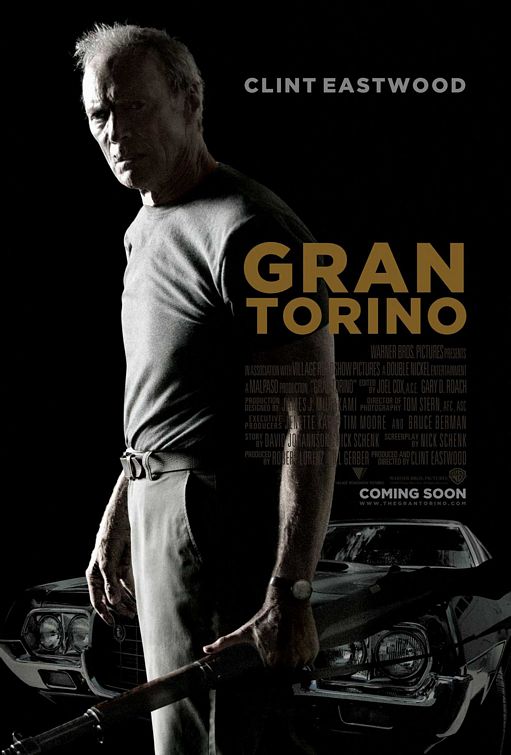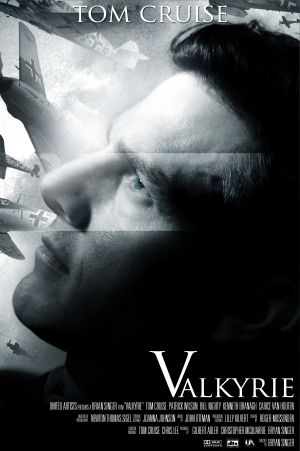 GRAN TORINO (2008, directed by Clint Eastwood, 116 minutes, U.S.)
GRAN TORINO (2008, directed by Clint Eastwood, 116 minutes, U.S.)
VALKYRIE (2008, directed by Bryan Singer, 120 minutes, U.S.)
THE CURIOUS CASE OF BENJAMIN BUTTON (2008, directed by David Fincher, 167 minutes, U.S.)
BY DAN BUSKIRK, FILM CRITIC
Our country’s economic future may be starting to resemble a three-card monte game but those brave and handsome Captains of Industry are standing tall at multiplexes this Christmas. Uberstars Tom Cruise, Clint Eastwood and Brad Pitt are all front and center on big movie posters this Christmas, marketing heroes who are protecting the poor, thinking traitorous thoughts and getting hotter with every day that passes.
During pre-production, Clint Eastwood’s Gran Torino was being rumored as the last chapter in the Dirty Harry saga and one of its strengths is that with a few tweaks the project very well could have been. Here Clint plays Walt Kowalski, a dying widowed vet and former auto worker, living on the last orderly patch of whiteness in a Michigan ghetto. He sits warily on his front porch, a step away from his shotgun while he has watches his neighborhood become populated by a Hmong community displaced during the Vietnam war. When his pristine 1972 Gran Torino has been targeted for theft by a young Asian gang his soldiering instincts once again kick into gear .
This gives the 78 year old Eastwood perhaps his last possible opportunity to pull out a large pistol while sneering threats through clenched teeth, which is Clint’s trademark much like John Wayne’s was punching people in the face. Clint does this act one last time and it is hard not to love him for it.
Along with gun-slinging the issue that is on Clint’s mind is race, though as you might fear, the 78 year old Republican grandfather’s worldview lacks subtlety . Clint remains blind to the basic idea that respectful social interaction demands that we allow people to decide the name they wish to be addressed. Instead, Clint breaks out SarahSilverman’s act, but without the cute part. While the script is part Death Wish-style revenge thriller and part social comedy, the comedy part mainly involves Clint sneering every foul name ever spit towards an Asian person, with each scene revealing a new ugly slur doled out to give the it a “zing”. Like a shock jock, no dog-eating gag is too low and the name-calling isn’t left as a colorful aside, it becomes the character’s most prevalent trait. It’s Eastwood as Imus.
The sequence where he teaches his young Hmong neighbor to be less sensitive to his slurs by observing Walt and his barber winkingly refer to each other as “pollacks” and “wops” is the type of education Archie Bunker might serve up. Despite the fact that Walt incites violence with the local youth gang, the Hmong neighbors roll their eyes and love this crotchety racist anyway, leaving mountains of Asian cuisine on his doorstep to honor their protector. When Clint takes his character unashamedly to a crucifixion finale the distinctions between Clint and his persona blur. Regardless, someone up on screen is displaying the ego of ColonelKurtz, making Gran Torino play like a voyage upriver to witness a old man gone all batshit crazy among the natives.
– – – – – –
Tom’s got his own martyr to play in Valkyrie and he dares us not to root for him, even if he’s a Nazi! Wait a minute, I know what you’re thinking: you don’t know what to think of Tom Cruise these days but you definitely do not like Nazis. Not so fast! Tom may be a Nazi, but he’s a best Nazi ever, a Nazi so good, he’d kill Hitler if he had the chance! Will he get the chance?
for him, even if he’s a Nazi! Wait a minute, I know what you’re thinking: you don’t know what to think of Tom Cruise these days but you definitely do not like Nazis. Not so fast! Tom may be a Nazi, but he’s a best Nazi ever, a Nazi so good, he’d kill Hitler if he had the chance! Will he get the chance?
If you know history you know that he does get the chance and he blows it (“Do we Americans have to do everything for you!” you can almost hear the audience scream) and failure is something Tom Cruise doesn’t do. The star magnitude of Tom Cruise is exactly what dooms this project though; this tale of scheming in the king’s court begs to be about character and suspense, instead the story has been inflated to fit the stature of myth of Tom.
Cruise , with the uncredited aid of a black eye-patch, plays the disillusioned Colonel Von Stauffenberg, recruited by a team of men who can assassinate Hitler and overthrow the Reich before the U.S. can bring the destruction of the turning tide. Armed with actors of the caliber of Tom Wilkerson, Terrence Stamp and KennethBranagh you might expect a claustrophobic drama of men nervously seeking out other traitorous comrades. Instead, Singer defaults into grand epic mode, forever craning up into big spectacular shots while the action is happening in small closed corners. Singer’s version of Nazi Germany shares the cartoony-ness of the Indiana Jones saga, and you almost expect the X-Men to swing in and supply extra help to the plotting Nazis.
The idea of committing treason against a government responsible for war crimes bounces around the film without ever threatening relevance (should we worry about it inspiring more shoe throwing?), instead the film seems to exist to show us how good Tom Cruise looks in vintage military garb and to polish up some old-fashioned Nazi-fetishism. It succeeds in both these small ambitions but otherwise this story of things that almost happened in WW2 remains slightly unfathomable as to its very existence.
– – – – – – –
 I can empathize with the fantasies in the above films, sure I’d like to crack wise and shoot criminals and sure, I’d like to blow up history’s most explodable dictator but I’m left perplexed by what fantasies people are exploring in The Curious Case of Benjamin Button. Loosely based on a F. Scott Fitzgerald novel, Benjamin Button more closely connected to the conservative fable-spinning of Forest Gump, which shares the same screenwriter in Eric Roth. Just because the film can be summed up in one high-concept sentence (“Brad Pitt is a guy who ages backwards”) doesn’t mean we’re examining man’s primal issues here. Instead the story seems designed to wow us with special effects and present a world so benign even a sixty year-old with the mind of a teenager can’t get into much trouble.
I can empathize with the fantasies in the above films, sure I’d like to crack wise and shoot criminals and sure, I’d like to blow up history’s most explodable dictator but I’m left perplexed by what fantasies people are exploring in The Curious Case of Benjamin Button. Loosely based on a F. Scott Fitzgerald novel, Benjamin Button more closely connected to the conservative fable-spinning of Forest Gump, which shares the same screenwriter in Eric Roth. Just because the film can be summed up in one high-concept sentence (“Brad Pitt is a guy who ages backwards”) doesn’t mean we’re examining man’s primal issues here. Instead the story seems designed to wow us with special effects and present a world so benign even a sixty year-old with the mind of a teenager can’t get into much trouble.
Born in the body of a tiny old man in Louisiana in 1918, Benjamin’s disgusted father abandons the shriveled little guy to the local Seniors home. Benjamin grows up there, soaking up wisdom from his black mammy named Queenie and quietly loving Daisy, a girl whose heart is the same age as his although their bodies are eighty years apart. After flirting with a little wartime drama in WW2 (when Brad looks like a little Ben Franklin with a comb-over) the film finally settles into being a ill-fated love story, with the heavily CGI’d Button quietly pining for Daisy (who grows into Cate Blanchett) to meet him in middle-age so they can properly become lovers.
For all the attention paid to aging Brad Pitt, the character of Benjamin himself could not be more empty; he appears to be without employment, skills or a life-long dream and his purring New Orleans accent doesn’t take much to philosophizing. Mainly we just gaze at Benjamin while he sits around looking beatific as the century drifts by for darn near three hours. Fincher’s direction takes on more of the rambling formlessness he exhibited in Zodiac and the closest thing to a real climax is when the make-up and effects are finally dispensed of and Benjamin Button finally emerges as the movie star hunk Brad Pitt really is.
When they try to de-age him further into his twenties and you sense the movie producers’ excitement with the idea of freezing stars digitally as their twenty-something selves. Even while leaving his smooth face in the shadows the effect looks unconvincing, the magic of Hollywood computers still unable to conjure the allure of a naturally-achieved Brad Pitt. That why the stars are still paid the big dollars; as ill-conceived as each of these vehicles is, without their bigger-than-life names-above-the-title, these films would be hardly worth discussing at all.
